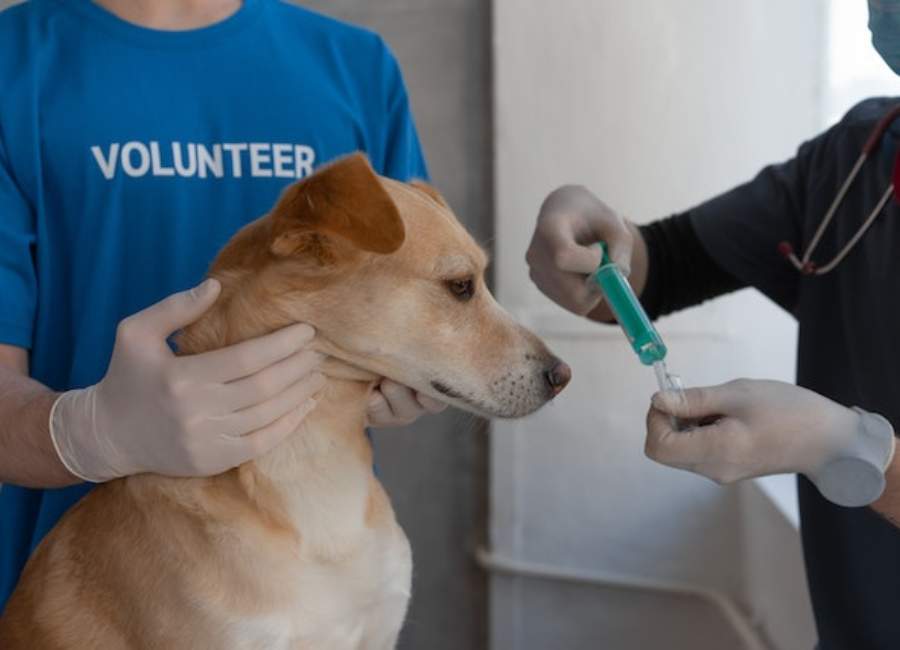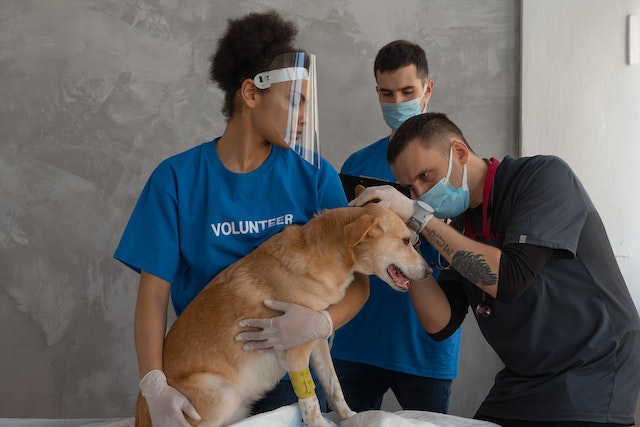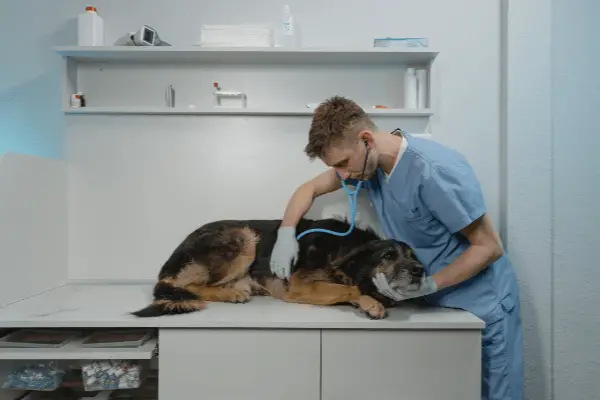10 Benefits Of Regular Vet Check-ups For Dogs

Everyone agrees that dogs are man’s best friend, but did you know that one of the greatest methods to maintain your pet’s health and happiness is through routine medical visits?
Taking your dog to the vet may aid in the early detection of any health concerns, which can ultimately save you time, money, and misery.
In this article, we’ll talk about the numerous advantages of routine vet visits for dogs and why it’s crucial to make sure your pooch is receiving the care they require.
Let’s get started…
Benefits Of Regular Vet Check-ups For Dogs
Here are some of the most common benefits of regular vet check-ups for dogs:
Catching Health Issues Early
Regular vet visits provide a number of important advantages, one of which is early detection of any possible health problems.
Given that dogs are unable to communicate problems with us, this is particularly crucial.
Any growing health concerns can be found via tests and examinations that your veterinarian can carry out.
Your veterinarian can create a treatment plan to stop additional complications and improve your dog’s chances of recovery by identifying these problems early.
Preventive Care
Another significant advantage of routine veterinary checkups for dogs is preventive treatment.
Your veterinarian may suggest immunizations, flea/tick repellent, and heartworm medicine as preventative methods to keep your dog healthy.
When compared to treating a problem after it has manifested, preventive therapy is frequently less expensive and more efficient.
Maintaining Optimal Health
Your dog’s health and happiness are ensured by routine visits to the veterinarian.
Your veterinarian will do a complete physical examination of your pet during a checkup to look for any symptoms of sickness or injury.
In order to determine your dog’s general health, they will also take their vital signs, such as their temperature, pulse, and respiration rate.
Any problems found can be handled before they worsen.
Professional Advice
When it comes to your dog’s health, vets are the authorities.
They may provide guidance on anything from training and grooming to food and exercise.
They may offer advice on what food is best to give your dog and how much exercise is appropriate for their breed and age.
Your veterinarian may also provide you with advice on how to teach your dog and use suitable grooming methods.
Tailored Care
Every dog is different, and routine checkups with the doctor provide customized treatment.
Your veterinarian can modify their advice to meet the unique requirements of your dog.
For instance, compared to pups or adult dogs, older canines may need different preventative measures and care.
Your dog’s specific health history, way of life, and present state of health can all be taken into consideration in the individualized treatment plan your veterinarian can offer.
Updates on Nutrition
Your veterinarian may also advise you on your dog’s dietary requirements, including the proper food and treats for their age, breed, and level of activity.
They can also provide you with advice on any vitamins or supplements that could be good for your dog’s health.
Build a Relationship
You may get to know your veterinarian better by going in often.
This might help ensure that your veterinarian is familiar with your dog and make it simpler to address any health issues you might have.
A veterinarian who is familiar with your dog’s personality and medical history might offer superior treatment.
Maintain Dental Health
Your dog’s entire health critically depends on dental health.
During a routine check-up, your veterinarian will examine your dog’s teeth and gums.
They may provide you with tips on how to maintain a healthy mouth and teeth for your dog.
If required, your veterinarian could advise getting your teeth cleaned or getting additional dental care.
Address Behavioral Issues
Veterinarians may offer advice on any behavioral problems your dog may be having, such as aggressiveness or nervousness.
If necessary, they can suggest training methods or medicine.
Early intervention for behavioral disorders can help avoid the emergence of more serious difficulties.
Peace of Mind
Regular vet check-ups give peace of mind knowing your dog is healthy and well-cared for.
When it comes to your pet, it’s always best to be safe than sorry.
Knowing that your dog is healthy and happy may offer you peace of mind and allow you to enjoy your time with them.
Frequently Asked Questions
How often should I take my dog to the vet for a check-up?
The frequency of check-ups will depend on your dog’s age, health, and any underlying medical concerns.
However, as a general rule, dogs should visit their veterinarian at least once a year for a check-up.
More frequent visits may be required for older pets and those with persistent health conditions.
What should I expect during a vet check-up for my dog?
Your veterinarian will do a physical exam on your dog during a regular vet check-up, evaluating vital signs, eyes, ears, teeth, and general body condition.
They may also suggest additional diagnostic procedures, such as blood work or urinalysis, to rule out any underlying health problems.
What are some of the potential health issues that can be caught early during a vet check-up?
Dental problems, skin infections, ear infections, heart disease, diabetes, and cancer are some of the health conditions that can be detected early during a vet check-up.
Early identification and treatment of these diseases can help to enhance your dog’s general health and lifetime.
Can regular vet check-ups help to prevent health issues in my dog?
Yes! Regular vet visits can help to avoid health problems in your dog by recognizing possible concerns early and offering preventative treatments such as immunizations, parasite management, and regular dental cleanings.
Are regular vet check-ups expensive?
The cost of a vet check-up varies based on your region and the precise treatments recommended by your veterinarian.
The cost of a check-up, on the other hand, is frequently significantly cheaper than the expense of treating a major health condition that could have been detected and addressed sooner.
Furthermore, many veterinarians provide wellness programs or other cost-cutting choices to assist pet owners to afford frequent check-ups.
Learn more about why dogs act weird.
What is the average price of Vet check-ups for dogs
The average cost of a vet check-up for a dog varies depending on the type of check-up being done.
Basic vet check-ups typically cost between $50 and $100, while more comprehensive check-ups, such as those involving blood tests or X-rays, can cost up to $400 or more.
Additionally, prices may vary depending on the vet and the area in which you live.
To get an accurate estimate of the cost of a vet check-up, it is best to contact your local vet.
Learn more about dog care tips.
Conclusion
Overall, regular vet visits are necessary for a pup to be happy and healthy.
Regular visits to the vet may aid in the early detection of potential health concerns, the prevention of illnesses, and the maintenance of your dog’s overall well-being.
In the end, routine veterinary visits are a terrific use of your time, money, and effort.
Set up a vet appointment for your dog right away to offer them the greatest chance for a long and healthy life.





![How Dogs Get Heartworm [2 Possible Ways] How dogs get heartworm](https://petcreeks.com/wp-content/uploads/2021/07/how-do-dogs-get-heartworm-768x644.jpg)
![Hairballs in Dogs [Causes, Signs & Remedies] Hairballs in Dogs](https://petcreeks.com/wp-content/uploads/2023/12/pexels-anna-bondarenko-7391070.jpg)